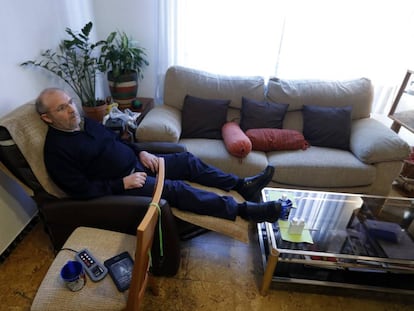Spain working on suicide prevention plan against over 3,500 annual deaths
Health Ministry will focus on early detection and communication, in a bid to address a taboo problem

Spain’s Health Ministry is launching a suicide-prevention strategy based on early detection and communication, in a bid to address a taboo problem that causes twice as many deaths as car accidents.
Health Minister Carmen Montón held a meeting last Friday with health professionals and associations to collect information aimed at launching a prevention plan against suicide, which is behind the deaths of between 3,500 and 4,000 people a year in Spain, according to data from the National Statistics Institute (INE). A further 8,000 people require hospital treatment after failed attempts to take their own lives.
There has been a surge in support groups in recent years
The ministry uses comparisons to illustrate the scope of the problem: there are 65 suicides for every death from gender violence, 11 for every homicide, and two for every road fatality. Yet there is no specific prevention policy in place, nor does the issue attract much media attention.
The suicide rate in Spain is 8.7 for every 100,000 inhabitants, while the global estimate is around 12 per 100,000, even though cases are believed to be under-reported. In Europe, the latest figure talks about 11.4 suicides per 100,000 inhabitants. In 2012, the World Health Organization (WHO) asked governments to work to bring this rate down to 10 per 100,000 by the year 2020. In 2014 the WHO demanded specific plans, but only around 30 countries have so far produced them, said the international agency.
In Spain, the suicide rate has remained stable for years, representing around 0.1% of annual deaths. By comparison, death rates from causes such as cancer, drugs and road accidents have been significantly reduced.
It’s tough to talk about it, but we need to talk about this problem so it will get included in the political agenda
Victim’s mother
Specialists and support groups say that prevention is possible. In Finland, the suicide rate has dropped from 13 per 100,000 to 10 per 100,000 in a decade, said Andoni Aseán, president of the Spanish Suicidology Association.
The Friday meeting will help the Spanish Health Ministry draft a plan that has a precedent in a regional suicide prevention program set up by Minister Montón in Valencia in 2017 when she was the regional health chief there. The ministry will propose that other regions adopt a similar strategy.
The Valencia region has been running ads on buses, and health professionals have been instructed to ask questions that could help detect people with suicidal thoughts. The next step involves getting those cases to a specialist as soon as possible – the protocol talks about 72 hours, although this is not always the case. According to Juan José Carballo, a psychiatrist at Gregorio Marañón Hospital in Madrid, 50% of young people who attempted suicide had never been to see a mental health specialist.
Suicide has been under-reported, partly out of fear of a contagion effect
Suicide, which is closely linked to depression, psychosis, addictions, personality disorders and bullying at school, has been under-reported, partly out of fear of a contagion effect. The WHO has warned about this possibility, and the EL PAÍS Style Guide says: “Psychology has ascertained that these news articles incite people who were already likely to commit suicide to do so.”
But experts gathered at a Madrid congress of the Spanish Suicidology Association said that it’s not about avoiding suicide stories, it’s about reporting on them well. And this means not going into personal details, and above all not disclosing the method used by the victim. “It’s tough to go through and it’s tough to talk about it, but we need to talk about this problem so it will get included in the political agenda and attract resources,” said one victim’s mother.
Although most people who take their own lives in Spain are older (917 who were 70 and over in 2016, according to INE), there were also 12 deaths among children under 15 years of age that same year, and 247 who were under 30.
There has been a surge in support groups in recent years: Después del Suicidio, Alaia, Besarkada, Apsas, Justa Alegría, Biziraun. They are all run by relatives of people who killed themselves and who want to prevent the same thing from happening to others. All of them say that there are signs that make prevention possible, although “our son only gave signs for one day,” notes Agustín Ezquizia. “It feels good to get together with others. At first we were very much alone,” adds his wife.
José Manuel Gómez Soriano, a researcher from Alicante University, has developed a program named Life! that analyzes people’s written texts to detect signs of sadness, concern and other markers. If the program finds enough signs, a professional is alerted who then gets in touch with the potential suicide victim.
English version by Susana Urra.









































